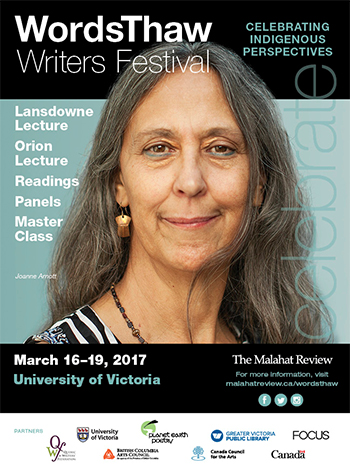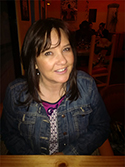Literary Festival Returns March 16-19 in Victoria, B.C.

The Malahat Review's annual literary symposium is back!
Take part in four days of readings, panel discussions, workshops, and one-on-one writing critiques with writers from coast to coast.
Featured authors include Jordan Abel, Joanne Arnott, Trevor Corkum, Misao Dean, Dan MacIsaac, Jennifer Manuel, Adam Olsen, Troy Sebastian,
Gail Scott,
Yasuko Thanh,
Philip Kevin Paul, Leanne Betasamosake Simpson, Richard Van Camp, and lots more!
Registration for all events is OPEN and we encourage you to view the Event Schedule on the WordsThaw website. New content will be posted regularly, so check back often!
Buy tickets today for the 2017 WordsThaw Writers Festival.
Indigenous Perspectives: Interview with Siku Allooloo
 In her creative nonfiction piece, "Caribou People," Siku Allooloo describes the distress and resolve that Indigenous people living in the north feel as climate change and resource extraction threaten to overwhelm their land and way of life. Interview with Malahat editor, John Barton. In her creative nonfiction piece, "Caribou People," Siku Allooloo describes the distress and resolve that Indigenous people living in the north feel as climate change and resource extraction threaten to overwhelm their land and way of life. Interview with Malahat editor, John Barton.
JB: You convincingly expose how wealth, even today, is colonialism's ultimate goal. How would you define "wealth"—material or otherwise—from an Inuit perspective?
SA: From my own little view as an Inuk woman and Dene family member, I would say wealth is being able to exist in full expression of who we are without threat of harm or domination. It is being nourished by our ancestral foods and medicines and cultures. Wealth is intimacy and wellness in relationships, autonomy, being able to grow more deeply in connection to the land and to this life through our practices and knowledge systems. It is being able to come back together and to invest future generations with vitality, belonging and strength, to know that they have everything they need to flourish and follow a good path on this earth. Wealth is generosity, respect, knowing your place in the world, and taking care of one another.
Read the rest of Siku's interview on the Malahat website.
Indigenous Perspectives: Interview with Lisa Bird-Wilson
 Malahat books reviewer and poet, Cara-Lyn Morgan, interviews Lisa Bird-Wilson about her short story, "Counselling," and poem, "City Slicker," as they appear in the Malahat's Indigenous Perspectives Issue. Malahat books reviewer and poet, Cara-Lyn Morgan, interviews Lisa Bird-Wilson about her short story, "Counselling," and poem, "City Slicker," as they appear in the Malahat's Indigenous Perspectives Issue.
CLM: In "Counselling," your ability to write an unreliable narrator without calling too obviously attention to her unreliability was done with such subtlety, we champion your speaker even though she tells us repeatedly and in a variety of ways that she cannot be trusted. In such a brief piece of writing, how were you able to still so convincingly develop this "anti-hero" type character while maintaining her charm, likability, and vulnerability? Can you talk a little about the role of trust and truth-telling when you are dealing with an unreliable narrative source?
LBW: First of all I'm glad to hear she's a sympathetic character, one who can be championed. I like your question because it forces me to reflect on a piece of writing and on the writing process. I honestly don't remember that I thought at all about this character being unreliable or untrustworthy. It would be destructive to the story to think about these things consciously in the writing stage. At least for me it would. If I thought about her character as unreliable I believe the story would show that by being too self-conscious. It would likely fall flat. Looking back on the story and the character, I think it's her vulnerability, and her belief in herself and her commitment to her actions, at least in the moment, that make her sympathetic. What she goes through is "truth" for her.
Read the rest of Lisa's interview on the Malahat website.
|